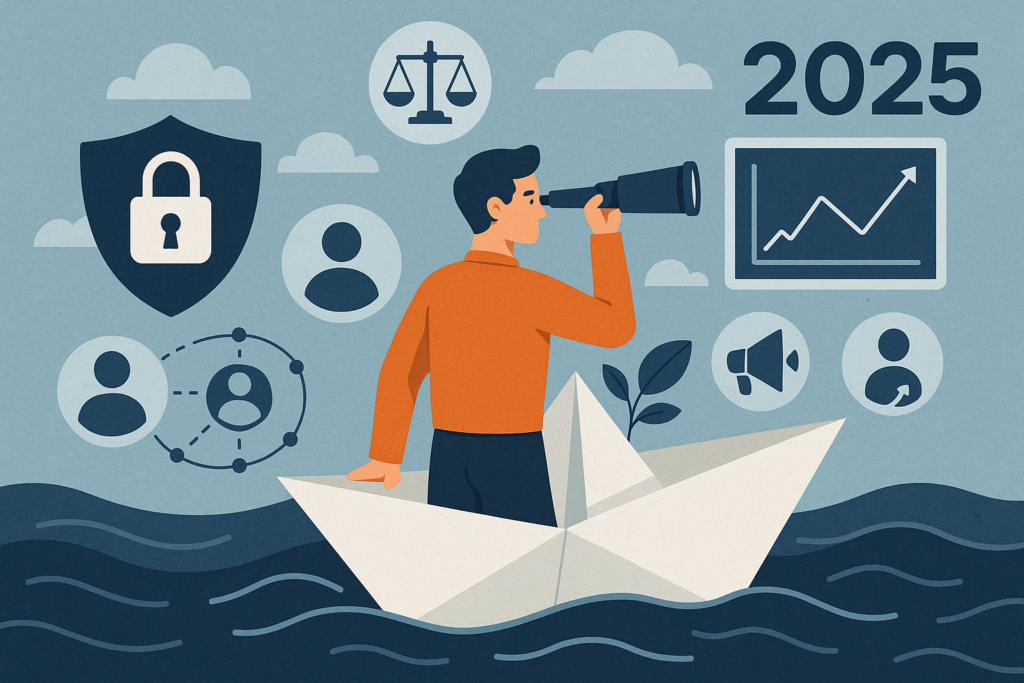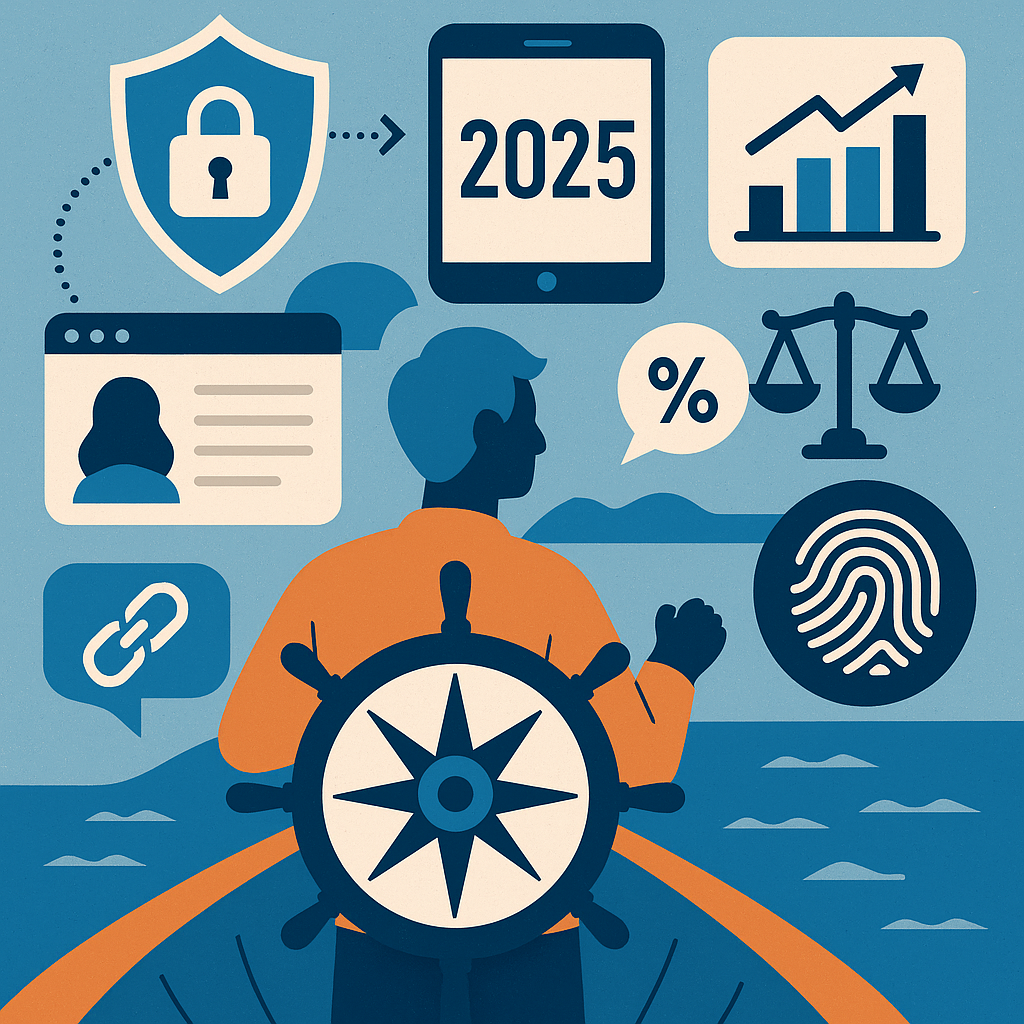
Key Points
Research suggests consumer concern about data privacy is growing, with searches doubling in five years.
It seems likely that stricter global regulations, like GDPR and LGPD, are pushing marketers toward compliance.
The evidence leans toward first-party data becoming essential as third-party cookies phase out.
Ethical marketing appears to include inclusivity, with brands addressing AI biases and diversity.
There’s a growing emphasis on transparency and technologies like data clean rooms to balance privacy and personalization.
Why Data Privacy Matters
In 2025, protecting consumer data is crucial as people become more aware of privacy issues. Marketers must follow strict laws and be open about how they use data to build trust. Failing to do so risks losing customers and facing penalties.
Shift to First-Party Data
With companies like Apple and Google phasing out third-party cookies, brands are focusing on collecting data directly from customers through sign-up forms or loyalty programs. This approach respects privacy and helps create personalized campaigns.
Ethical and Inclusive Marketing
Ethical marketing goes beyond privacy, ensuring campaigns represent diverse audiences and avoid biases in AI tools. Brands like Coca-Cola and Starbucks show how aligning with values like sustainability and equity can strengthen customer loyalty.
Using Technology Wisely
Tools like data clean rooms and privacy-enhancing technologies help marketers personalize campaigns while keeping data safe. These innovations allow brands to stay effective without compromising consumer trust.

Comprehensive Guide to Data Privacy and Ethical Marketing in 2025
In 2025, data privacy and ethical marketing have become non-negotiable pillars of successful digital strategies. As consumer awareness of data misuse grows—evidenced by a doubling in “data privacy” searches over the past five years—marketers face increasing pressure to adopt transparent, compliant, and value-driven practices. Stricter global regulations, the phasing out of third-party cookies, and a demand for inclusivity are reshaping how brands engage with audiences. This comprehensive guide explores the key trends and strategies for navigating data privacy and ethical marketing in 2025, offering actionable insights to build trust, ensure compliance, and drive engagement in a competitive digital landscape.
The Evolving Regulatory Landscape
The global regulatory environment for data privacy is more complex than ever in 2025. The European Union’s General Data Protection Regulation (GDPR) continues to set a high standard, with recent fines, such as €310 million against LinkedIn for improper data processing, underscoring the consequences of non-compliance (WeLiveSecurity - Data Privacy Trends). Beyond Europe, Brazil’s Lei Geral de Proteção de Dados (LGPD) and India’s Digital Personal Data Protection Act (DPDP) are tightening expectations, while the U.S. sees a patchwork of state laws, with new regulations in Delaware, Iowa, and Nebraska effective this year (Wiley - Privacy Developments 2025). The EU’s Digital Services Act also imposes stricter rules on online platforms, demanding transparency in data handling. Marketers must navigate this multifaceted regulatory landscape, ensuring compliance across jurisdictions to avoid penalties and reputational damage. This trend highlights the need for audit-ready data architectures and dynamic policy updates to stay compliant.
The Shift to First-Party Data
The phasing out of third-party cookies by tech giants like Apple and Google has fundamentally altered data collection strategies. Apple’s Safari browser has blocked third-party cookies since 2020, and Google’s planned phase-out is nearing completion (Cordial - Data Privacy Impact). As a result, marketers are pivoting to first-party data—information collected directly from consumers through interactions like website visits, sign-up forms, or loyalty programs. First-party data is not only more accurate but also aligns with privacy regulations, as it requires explicit user consent. Strategies like consent-driven email campaigns and opt-in forms are gaining traction, allowing brands to build robust data sets while respecting consumer preferences. For example, offering exclusive content or discounts in exchange for data encourages voluntary sharing, fostering trust and enabling personalized campaigns that resonate with audiences.
Data Type | Source | Benefits | Challenges |
|---|---|---|---|
First-Party Data | Direct consumer interactions (e.g., sign-ups, purchases) | Accurate, privacy-compliant, builds trust | Requires consumer consent, investment in collection systems |
Third-Party Data | External vendors (e.g., cookies, data brokers) | Broad reach, easy access | Phasing out, privacy concerns, less reliable |
Building Trust Through Transparency
Transparency is the cornerstone of consumer trust in 2025. With data breaches and misuse making headlines, consumers demand clarity on how their information is collected, stored, and used. Brands that excel in transparency, like Apple with its privacy-centric campaigns, enhance their reputation and customer loyalty (Digital Marketing Institute - Data Privacy). Marketers should adopt clear privacy policies, user-friendly consent mechanisms, and regular communication about data practices. Implementing privacy-by-design principles—embedding privacy considerations into every stage of the marketing process—ensures compliance and builds confidence. For instance, providing easy-to-understand opt-in forms and explaining data usage in plain language can differentiate brands in a crowded market, encouraging consumers to engage without fear of misuse.
Ethical Marketing: Embracing Inclusivity
Ethical marketing extends beyond data privacy to encompass inclusivity and fairness. Consumers in 2025 expect brands to represent diverse demographics and align with values like sustainability and social equity. Coca-Cola’s recycling-focused campaigns and Starbucks’ commitment to social equity resonate with audiences who prioritize purpose-driven brands. A critical aspect of ethical marketing is eliminating biases in AI algorithms used for targeting and personalization. Biased algorithms can perpetuate discrimination, alienating segments of the audience and damaging brand reputation. Marketers must audit their AI tools and campaign content to ensure inclusivity, reflecting the diverse values and identities of their audience. This approach not only avoids backlash but also fosters deeper connections with consumers who value corporate responsibility.
Leveraging Technology for Privacy and Personalization
Technological innovations are enabling marketers to balance privacy with effective personalization. Data clean rooms, adopted by companies like Paramount and Disney, allow brands to collaborate on audience insights without exposing sensitive data, ensuring privacy-compliant advertising (Exploding Topics - Privacy Trends). Privacy-Enhancing Technologies (PETs), such as differential privacy and homomorphic encryption, enable data analysis while protecting individual privacy. AI also plays a dual role: it powers personalization by analyzing consumer behavior, but it must be used ethically to avoid privacy violations. For example, AI can automate compliance tasks, like redacting sensitive information, reducing the risk of breaches. By integrating these technologies, marketers can deliver tailored campaigns while maintaining consumer trust.
Technology | Function | Marketing Benefit |
|---|---|---|
Data Clean Rooms | Secure data collaboration | Targeted ads without data exposure |
PETs (e.g., Differential Privacy) | Protect individual data during analysis | Enables privacy-compliant insights |
AI Compliance Tools | Automate data protection tasks | Reduces breach risks, ensures compliance |
Practical Strategies for Marketers
To thrive in 2025’s privacy-focused landscape, marketers can adopt the following strategies:
Build a Robust Privacy Framework: Develop policies that comply with global regulations, ensuring data collection and usage are audit-ready.
Prioritize First-Party Data: Invest in opt-in mechanisms like loyalty programs and consent-driven campaigns to collect reliable data.
Enhance Transparency: Use clear privacy policies and user-friendly consent forms to communicate data practices openly.
Adopt Privacy-Enhancing Technologies: Leverage data clean rooms and PETs to balance personalization with privacy.
Train Teams on Compliance: Educate staff on data privacy best practices to ensure consistent adherence.
Monitor Regulatory Changes: Stay updated on new laws and adjust strategies to remain compliant.
Engage Consumers on Privacy: Involve customers in privacy discussions, gathering feedback to demonstrate commitment.
Conclusion
In 2025, data privacy and ethical marketing are critical for building trust and driving success in digital campaigns. The evolving regulatory landscape, shift to first-party data, and demand for transparency and inclusivity require marketers to adapt swiftly. By leveraging technologies like data clean rooms and PETs, and aligning with consumer values, brands can create personalized, ethical campaigns that resonate deeply. Prioritizing privacy-by-design and fostering open communication will not only ensure compliance but also position brands as trusted leaders in a competitive market. As consumer expectations continue to rise, embracing these trends will be key to achieving sustainable growth and lasting customer loyalty.